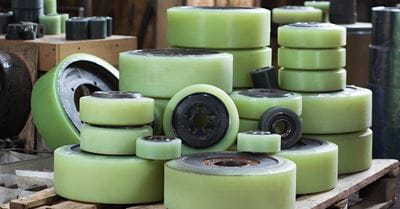Forklift Tires | Boise

We supply tires for all forklifts, not just Raymond!
Raymond maintains one of the largest material handling parts divisions in the West.
Call now and let us help you find the parts you need:
(800) 675-2500
Lift trucks come in many different sizes and shapes, and each kind of forklift uses a unique set of tires. In general, tires are classified as cushion or pneumatic, however there are some distinctions within those categories. Pneumatic tire and cushion tire lift trucks have different structures, so they are not cross-compatible.
While most forklift tires are durable and tough, they do need to be changed out every now and then. Raymond West sells tires for all sorts of lift trucks at extremely affordable prices.
Cushion Tires
At times referred to as Press On Tires, this type of tire is generally used indoors, and at times outdoors on level surfaces. Press on tires have a smaller diameter than different kinds of forklift tires, and thus possess a shorter turning radius; making them ideal for confined circumstances such as warehouse aisles. Fixating a cushion tire on a lift truck wheel mandates the use of a hydraulic press.
As part of the cushion tire selection, two general types are found:
Rubber Cushion Tires: Rubber cushion tires are often used inside or on even surfaces outdoors such as concrete or asphalt. They consist of solid rubber, attaching to fit around a steel band. This sort of tire can come smooth or with treading. Usually the front tires will have a tread while the rear tires that control steering lack treading.
Polyurethane Cushion Tires: Solid polyurethane tires can support larger loads than their rubber counterparts, and they are ideal for use in narrow aisles, order pickers and other warehouse jobs. These lightweight tires are more resistant to tearing, chunking, and splitting as opposed to rubber, and their life can be up to twice as long as rubber when taken care of.
Pneumatic Tires
Pneumatic and solid pneumatic tires often are used for outdoor applications, and are better equipped for uneven or rough surface conditions compared to cushion tires. They possess excellent traction and higher ground clearance which makes them well suited to rougher surfaces.
Regular Pneumatic Tires: This kind of pneumatic tire is pumped up with air, and is optimally used on rougher surfaces where shock absorption is a concern, for both the safety of the forklift and the comfort of the operator. The one concern about these tires is that they are more easily punctured, and they are sometimes filled with foam instead of air to ward off flats.
Solid Pneumatic Tires: Solid pneumatic tires are good for flat surface inside and outside heavy duty scenarios. Built from solid rubber and basically puncture resistant, they work best for environments with sharp objects, such as recycling yards or construction sites.
Non Marking Tires
Non-marking options are available for solid, solid pneumatic, and pneumatic tires. They are constructed using hydrated silicas and other additives to refrain from leaving floors covered in black marks.
These sorts of tires are frequently used in retail or other areas where clean floors are important. They are likewise used in certain industrial or food processing plants where dust reduction and cleanliness are factors.
There are some drawbacks to using non-marking tires. Firstly, sometimes they don’t have the durability of traditional tire varieties and as such need to be replaced more often. Another issue is that they are more prone to static electricity buildup, and a forklift using them has to be equipped with
Forklift Tires Near Me
When properly maintained, your forklift tires can decrease energy consumption, greatly improve operator comfort, and elevate your collective productivity. To speak with a lift truck tire advisor, give Raymond West a call today!
Raymond West | Boise Forklift Dealer
743 W McGregor Ct #100
Boise, ID 83705
(800) 675-2500
Raymond West's Boise service center serves most of Idaho, including Boise, Nampa, Meridian, Idaho Falls, Caldwell, Pocatello, Twin Falls, Post Falls and surrounding areas.

